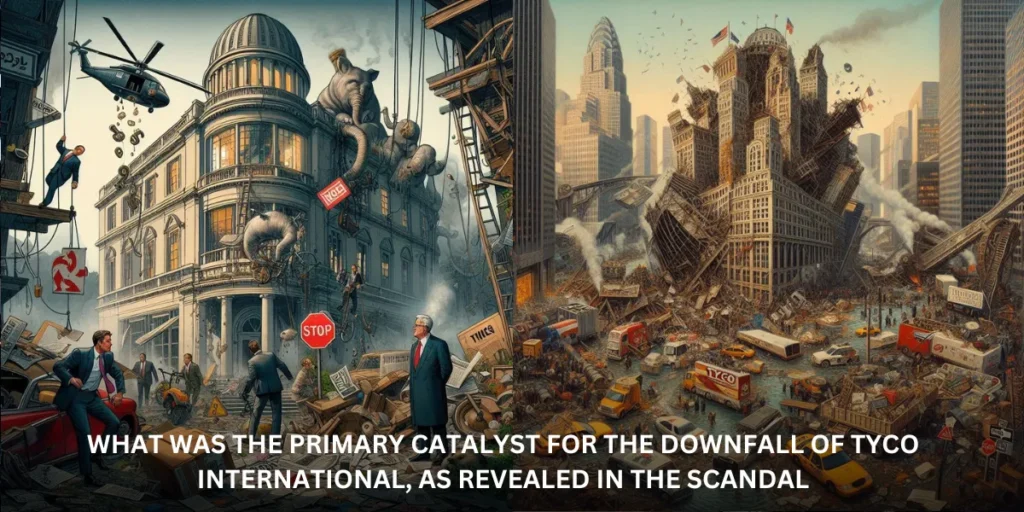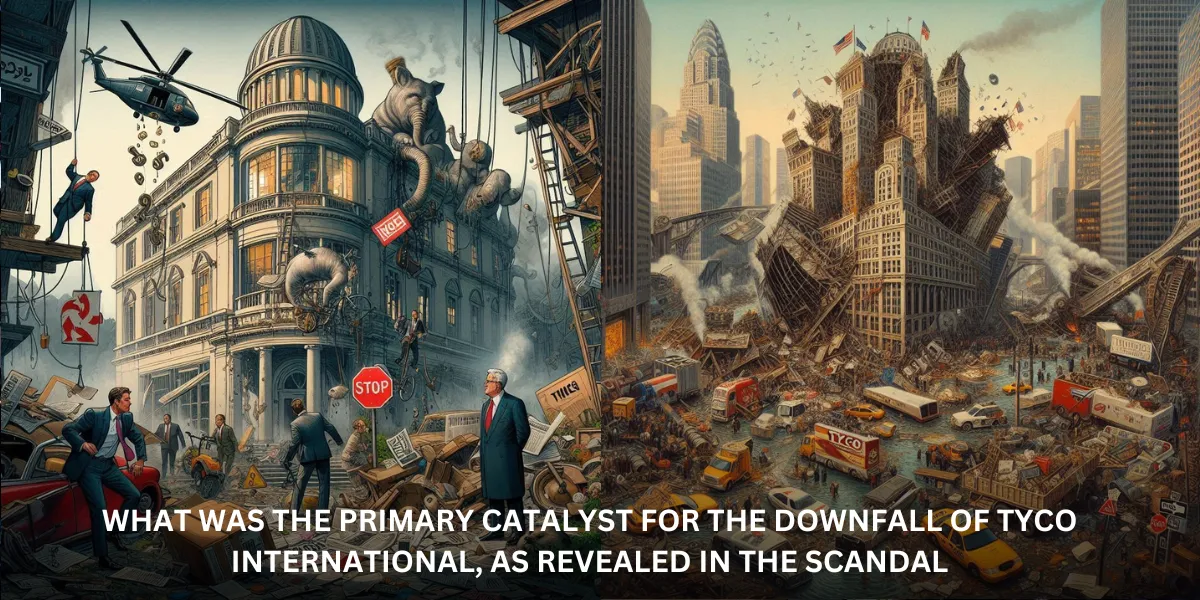what was the primary catalyst for the downfall of tyco international, as revealed in the scandal ? The Downfall of Tyco International: Unraveling the 2002 Accounting Scandal Tyco International’s demise, once a behemoth in the industrial and service sectors, serves as a sobering lesson in corporate greed and corruption. The business’s murky past surfaced in 2002, exposing a significant accounting scam led by Dennis Kozlowski, the CEO, and Mark Swartz, the CFO. These executives pilfered about $600 million for their own benefit, which included manipulating financial statements, lavish purchases, and unjustified bonuses. This information destroyed investor trust, sending the company’s stock down and resulting in serious legal issues. However, given what the investigation has shown, what was the main cause of Tyco International’s demise? Let’s explore this notorious tale.
The Rise of Tyco International
what was the primary catalyst for the downfall of tyco international, as revealed in the scandal? In the past, Tyco International was a model of corporate success. After being founded in 1960, the business expanded quickly through a number of acquisitions, turning into a multifaceted conglomerate with interests in security systems, healthcare, electronics, and other industries. Tyco was a dominant force in the market with significant revenues by the late 1990s.

The Key Players: Kozlowski and Swartz
Dennis Kozlowski and Mark Swartz were the gurus running Tyco’s finance department. The CEO, Kozlowski, was well-known for his forceful acquisition tactics and opulent way of living. The CFO, Swartz, was crucial in overseeing the business’s financial operations. While working together, they gave the impression that they were taking Tyco to new heights, but in reality, they were masterminding one of the largest corporate scams in history.
Unveiling the Scandal
Early in 2002, the scandal erupted, startling the business community. Kozlowski and Swartz were found to have been embezzling business money for their own purposes. This was a major embezzlement conspiracy that had been ongoing for years, not a small-scale fraud or mistake.
Embezzlement and Unauthorized Bonuses
Unauthorized bonuses were one of the main ways that Kozlowski and Swartz stole money. They gave themselves and other senior executives huge incentives that the board never approved. It was challenging to find these bonuses since they were frequently concealed in the business’s financial statements.
Extravagant Purchases
Not only did Kozlowski and Swartz pilfer money, but they also used corporate monies to make lavish expenditures. what was the primary catalyst for the downfall of tyco international, as revealed in the scandal These included lavish residences, pricey jewelry and artwork, and even a $2 million birthday celebration for Kozlowski’s spouse. Their extravagant spending was so extravagant that it just emphasized how greedy they were.
Financial Statement Manipulation
Kozlowski and Swartz falsified Tyco’s financial statements in order to hide their tracks. To conceal the full scope of their thievery and inflate the company’s earnings, they employed accounting gimmicks. In addition to misleading investors, this fraud raised Tyco’s stock price unnaturally, hiding the company’s true issues.
The Catalyst for Tyco’s Downfall
What, then, was the main factor that contributed to Tyco International’s demise as the scandal made clear? It was the result of a confluence of systemic governance shortcomings, unethical behavior, and corporate avarice. When a whistleblower came forward and an internal investigation was launched, the controversy was made public. After the extent of the corruption was revealed by the investigation, Kozlowski and Swartz were charged with crimes.
Impact on Investors and Stock Price
The stock price of Tyco suffered greatly upon the scandal’s disclosure. Startled by the breach of confidence, investors started liquidating their shares in large quantities. The stock price crashed, erasing market value worth billions of dollars. Tyco’s demise was largely caused by this financial setback, which damaged investor confidence and made it difficult for the business to turn things around.
Legal Consequences for Executives
Due of their conduct, Kozlowski and Swartz were subject to harsh legal repercussions. Multiple counts of grand larceny, conspiracy, securities fraud, and fabricating business records were brought against both of them. They were found guilty in 2005 and given long prison sentences. Tyco’s resources were depleted and its reputation was further damaged by the legal disputes.
Corporate Governance Failures
The controversy brought to light serious shortcomings in Tyco’s corporate governance. Due to insufficient oversight by the board of directors, Kozlowski and Swartz were able to act without consequence. what was the primary catalyst for the downfall of tyco international, as revealed in the scandal The executives’ ability to commit such a massive fraud was largely due to a lack of control and responsibility.
The Aftermath and Recovery Efforts
Tyco made major restructuring measures in the wake of the crisis in an attempt to regain stability and repair its reputation. Stricter financial controls were put in place, corporate governance procedures were revised, and top management was removed. The goals of these initiatives were to prevent further wrongdoing and to win back the faith of investors.
Lessons Learned / what was the primary catalyst for the downfall of tyco international, as revealed in the scandal?
Strong corporate governance and moral leadership are crucial, as the Tyco scandal makes very clear. It emphasizes how crucial responsibility, openness, and careful monitoring are to stopping corporate fraud. Businesses need to put a premium on moral behavior and make sure that their executives are held to the highest moral standards.
Comparative Analysis with Other Scandals
The Tyco crisis is similar to other business scandals like Enron and WorldCom in that it involves greed, dishonesty, and a lack of monitoring. These examples show how unethical behavior and structural flaws can have disastrous effects on businesses and their stakeholders.
Public Perception and Media Coverage
The public’s impression of the Tyco affair was significantly shaped by the media. Public indignation and condemnation were stoked by extensive reportage of the executives’ extravagant lifestyles and dishonest acts. The controversy turned into a representation of corporate excess and greed, which made the business sector even more in need of accountability and stronger rules.
Conclusion
Tyco International’s demise serves as a clear illustration of how corporate greed and corruption can cause even the most prosperous businesses to fail. what was the primary catalyst for the downfall of tyco international, as revealed in the scandal Dennis Kozlowski and Mark Swartz, two of Tyco’s top executives, acted unethically, which was the main cause of the company’s demise, as the scandal made clear. Their financial trickery and embezzlement destroyed investor trust, which precipitated a sharp drop in the company’s profits. Businesses should take note from this crisis, which highlights the vital significance of moral leadership, openness, and strong corporate governance.
FAQ
1. What factors contributed to Tyco International’s demise?
A significant accounting scandal involving Dennis Kozlowski, the CEO of Tyco International, and Mark Swartz, the CFO, who embezzled about $600 million for personal use, was the main cause of Tyco International’s demise.
2. How did Mark Swartz and Dennis Kozlowski steal money from Tyco?
Kozlowski and Swartz embezzled money by making expensive expenditures, receiving bonuses without authorization, and falsifying financial documents to conceal their activities.
3. How did the controversy affect Tyco’s stock price?
Tyco’s stock price crashed as a result of the scandal, wiping out billions of dollars in market value and shattering investor trust.
4. What were Kozlowski and Swartz’s legal repercussions?
Multiple charges of grand theft, conspiracy, securities fraud, and fabricating company records were brought against both executives. They received severe prison sentences after being proven guilty.
5. What takeaways are there from the Tyco controversy?
The Tyco affair serves as a reminder of the value of moral leadership, strong corporate governance, accountability, and openness in stopping corporate fraud and guaranteeing a business’s long-term success.

